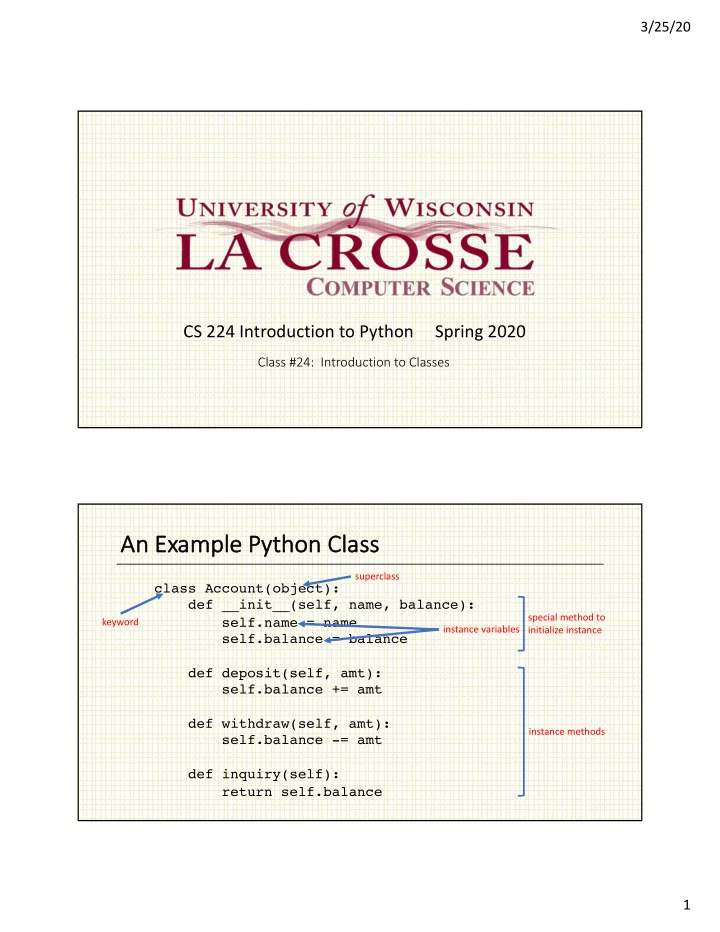

3/25/20 CS 224 Introduction to Python Spring 2020 Class #24: Introduction to Classes An An Example Python Cl Class superclass class Account(object): def __init__(self, name, balance): special method to keyword self.name = name instance variables initialize instance self.balance = balance def deposit(self, amt): self.balance += amt def withdraw(self, amt): instance methods self.balance -= amt def inquiry(self): return self.balance 1
3/25/20 Th The Details • object is the root of the class tree • use it as superclass when you are not extending another class • __init__ implicitly defines instance variables • self is a parameter to all instance methods • but you don’t include it in the parameter list when you call an instance method • technically you can use any identifier in place of self (but don’t do it!) Augmenting the Example: Au class Account(object): num_accounts = 0 class variable def __init__(self, name, balance): self.name = name self.balance = balance Account.num_accounts += 1 def __del__(self): special method to Account.num_accounts -= 1 cleanup, etc. def deposit(self, amt): self.balance += amt def withdraw(self, amt): self.balance -= amt 2
3/25/20 Mor More D Details • class variables are like static variables in Java • they belong to the class not to an instance • all instances share a single copy of a class variable • __del__ is often absent • it is used to do things such as update class variables (as in our example), close network connections, release locks, etc. • calling del on an object does not necessarily invoke __del__ -- del reduces reference count Creating Instances: Cr from account import Account checking = Account(’David’, 50000) Create two Account instances savings = Account(‘David’, 1000000) self does not # it’s payday appear here checking.deposit(25000) # can I buy a 488? if savings.inquiry() > 500000: access class variable print(“Go shopping. Make sure it’s red.”) prints 2 print(‘Created: {}‘.format(Account.num_accounts)) 3
3/25/20 Ex Exercise se • Exercise: create a Python class called Car • This class should include: • Three attributes • make • model • Year • Class variable num_cars that tracks the number of cars created • An __init__ method • Method print_description that prints the attributes for a Car instance • Setter methods for each of the attributes • Write a main method that creates a couple of Car instances and applies methods to them Ex Exercise se so solut ution class Car(object): num_cars = 0 def __init__(self, make, model, year): self.make = make self.model = model self.year = year num_cars += 1 4
3/25/20 Ex Exercise se so solut ution def print_description(self): print(‘Make: {}’.format(self.make)) print(‘Model: {}’.format(self.model)) print(‘Year: {}’.format(self.year)) def set_make(self, new_make): self.make = new_make def set_model(self, new_model): self.model = new_model def set_year(self, new_year): self.year = new_year Ex Exercise se so solut ution def main(): f488 = Car(‘Ferrari’, ‘488’, ‘2019’) mc40 = Car(‘MINI’, ‘Cooper S’, ‘2004’) f488.print_description() mc40.set_model(‘Cooper S MC40’) print(‘Number of cars = {}’.format(Car.num_cars)) if __name__ == ‘__main__’: main() 5
Recommend
More recommend